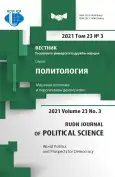Constructing the Ideology of the Right-Wing Radical Party in Modern United Kingdom: The Case of the United Kingdom Independence Party
- Авторлар: Golovin M.S.1
-
Мекемелер:
- Chelyabinsk State University
- Шығарылым: Том 23, № 3 (2021): World Politics and Prospects for Democracy
- Беттер: 446-462
- Бөлім: PARTIES IN POLITICS: THE IDEOLOGY OF RADICALISM AND REGIONALISM
- URL: https://journal-vniispk.ru/2313-1438/article/view/322571
- DOI: https://doi.org/10.22363/2313-1438-2021-23-3-446-462
- ID: 322571
Дәйексөз келтіру
Толық мәтін
Аннотация
This article examines the update of ideological foundations of the largest right-wing radical party in Britain (and in the whole of Europe) - the United Kingdom Independence Party (UKIP). The subject of the research is the party’s programmatic text, Manifesto for Brexit and Beyond, a document that is not limited to the discussion of Brexit alone. This document appeared at the end of 2019 and, despite the frequent change of leadership in the party during 2020, remained the ideological foundation of the organization after Brexit. The aim of the article is to analyze how the ideological base of the right-wing British radical party was formed in the socio-political realities of the initial period after the state’s exit from the European Union. The paper presents a discursive analysis of the main ideological document of one of UKIP, as well as identifies the ideological positions of British right-wing radicals at the present stage. Since the research is mainly practice-oriented, the main results are presented the data obtained through discourse analysis using to the method of R. Wodak. The data testify the changes that have been taking place in the discourse of the extreme right in Britain in recent years, as well as the prospects for its evolution in the coming years after Brexit. Studying UKIP’s discourse, the author concludes that it forms depending on the political, social and cultural conditions that prevail in modern British society, as well as on the general European context. The article also shows how a modern right-wing radical party constructs its discourse using the most painful issues for the society within the framework of political struggle.
Негізгі сөздер
Авторлар туралы
Mikhail Golovin
Chelyabinsk State University
Хат алмасуға жауапты Автор.
Email: golovin.mihail@mail.ru
ORCID iD: 0000-0002-4339-4842
Lecturer at the Department of Political Science and International Relations
Chelyabinsk, Russian FederationӘдебиет тізімі
- Caiani, M. (2007). Radical right-wing movements: Who, when, how and why? Sociopedia.
- Caiani, M., & Kröll, P. (2017). Nationalism and populism in radical right discourses in Italy and Germany. Javnost – The Public. 24, 1–19. doi: 10.1080/13183222.2017.1330084
- Carter, E. (2005). The extreme right in Western Europe: Success or failure? Manchester University Press.
- Dzenis, S., & Nobre Faria, F. (2020). Political correctness: The twofold protection of liberalism. Philosophia, 48, 95–114.
- Eatwell, R. (2000). The rebirth of the ‘extreme right’ in Western Europe? Parliamentary Affairs. 53, 407–425.
- Ford, R., & Goodwin, M. (2014). Understanding UKIP: Identity, social change and the Left Behind. Political Quarterly [Online] 85, 277–284.
- Ford, R., & Goodwin, M.J. (2014). Revolt on the right: Explaining support for the radical right in Britain. Routledge.
- Goodwin, M.J. (2011). New British fasсism: Rise of the British National Party. Routledge.
- Goodwin, M.J. (2014). Forever a false dawn? Explaining the electoral collapse of the British National Party (BNP). Parliamentary Affairs, 67.
- Greig, A. (2019). Masculinities and the rise of the far-right. Implications for Oxfam’s Work on Gender Justice.
- Jamin, J. (2014). Cultural marxism and the radical right. In: Jackson, P. & Shekhovtsov, A. The Post-War Anglo-American Far Right: A Special Relationship of Hate (pp. 84–103). New York: Palgrave Macmillan.
- Kitschelt, H. (1997). The radical right in Western Europe. University of Michigan Press.
- Mudde, C. (2007). Populist radical right parties in Europe. N. Y.: Cambridge University Press.
- Pankratov, V.V. (2014). The ideology of right-wing radicalism: problems of conceptualization. In: Integration of national science into the world: problems, trends and prospects. International conference proceedings (pp. 247–261). Moscow: Nauchnoye obozrenie. (In Russian).
- Ralph-Morrow, E. (2020). The right men: How masculinity explains the radical right gender gap. Political Studies. July 2020. doi: 10.1177/0032321720936049.
- Rydgren, J. (Ed.). (2013). Class politics and the radical right (pp. 1–9). London: Routledge.
- Shveytzer, V.Ya. (Ed.). (2018). Parties and movements of political alternative in contemporary Europe. Moscow: IE RAS. (In Russian)
- Wodak R. (2018). The politics of fear: What right-wing populist discourses mean (pp. 139–140). Kharkiv: Humanitarian Center. (In Russian).
Қосымша файлдар









